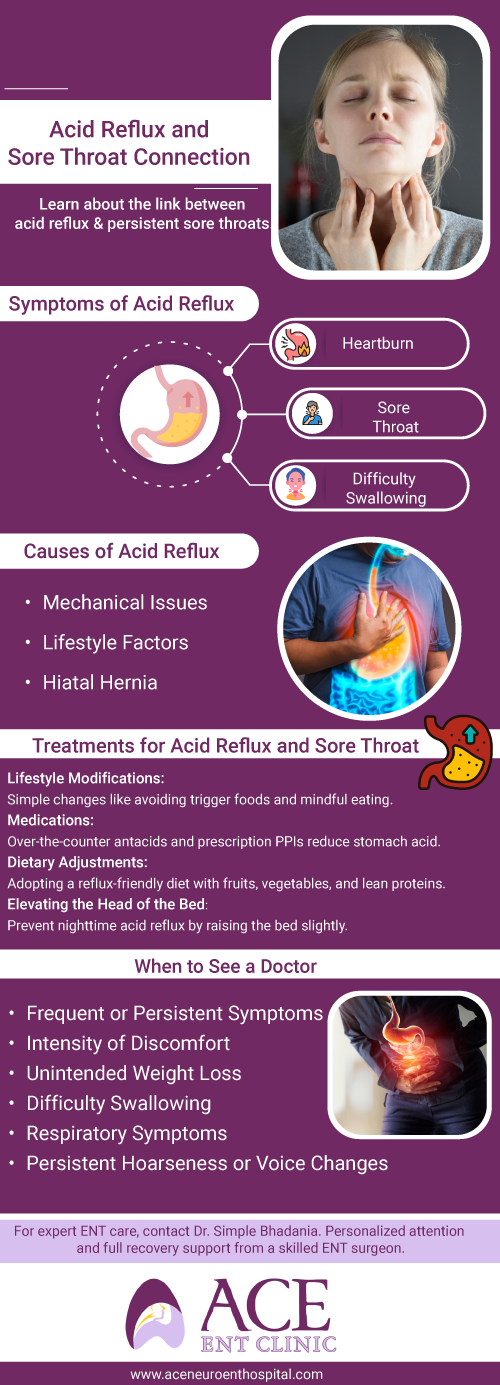Have you ever experienced a persistent sore throat that just won’t seem to go away? Surprisingly, the culprit might not be the common cold but rather something else – acid reflux. In this comprehensive guide, we’ll delve into the connection between acid reflux and sore throat, and answer questions like do acid reflux cause sore throat? By exploring the causes and various treatments available to alleviate this discomfort.

Understanding Acid Reflux:
Acid reflux, also known as gastroesophageal reflux disease (GERD), occurs when stomach acid flows backward into the esophagus, causing irritation. While most people associate acid reflux with heartburn, it can manifest in other ways, including the less-known symptom – a sore throat.
Common Symptoms of Acid Reflux:
- Heartburn: The hallmark symptom of acid reflux, heartburn, is characterized by a burning sensation in the chest. It often occurs after meals or when lying down.
- Sore Throat: Acid reflux when it reaches beyond the chest, causing irritation to the throat. This can result in a persistent sore throat, often accompanied by a scratchy or hoarse voice.
- Difficulty Swallowing: The corrosive nature of stomach acid can impact the muscles in the esophagus, making acid reflux difficulty swallowing. This difficulty swallowing, known as dysphagia, is another common symptom of acid reflux.
Can Acid Reflux Cause Sore Throat?
The short answer is yes. Acid reflux has been identified as a potential culprit behind recurring sore throats. The acidic content that regurgitates into the esophagus can irritate the throat lining, leading to discomfort and a persistent sore throat.
Acid Reflux and Difficulty Swallowing: A Troublesome Duo
Another symptom often linked to acid reflux is difficulty swallowing. The corrosive nature of stomach acid can affect the muscles in the esophagus, making the act of swallowing more challenging. This dual impact on the throat raises important questions about the relationship between acid reflux and difficulty swallowing.
Exploring the Causes:
- Mechanical Issues: One primary cause of acid reflux and its associated symptoms is a malfunctioning lower esophageal sphincter (LES). The LES is a ring of muscle that acts as a valve between the esophagus and the stomach. When it doesn’t close properly, stomach acid can escape into the esophagus, causing irritation and leading to sore throat and difficulty swallowing.
- Lifestyle Factors: Certain lifestyle choices can contribute to acid reflux. Overeating, consuming acidic or spicy foods, and lying down immediately after a meal are common triggers. Understanding and modifying these behaviors can significantly reduce the likelihood of acid reflux and its effects on the throat.
- Hiatal Hernia: A hiatal hernia occurs when the upper part of the stomach bulges through the diaphragm into the chest cavity. This condition can disrupt the normal functioning of the LES, allowing stomach acid to flow back into the esophagus and cause throat-related symptoms.
Treatments for Acid Reflux and Sore Throat:
- Lifestyle Modifications: Making simple changes to your lifestyle can have a profound impact on acid reflux symptoms. Avoiding trigger foods, maintaining a healthy weight, and practicing mindful eating can significantly reduce the occurrence of acid reflux and alleviate throat discomfort.
- Medications: Over-the-counter antacids and prescription medications that reduce stomach acid production, such as proton pump inhibitors (PPIs), can provide relief from acid reflux symptoms. These medications aim to neutralize or decrease the production of stomach acid, minimizing its impact on the esophagus.
- Dietary Adjustments: Adopting a reflux-friendly diet can play a crucial role in managing acid reflux and its associated symptoms. This may involve limiting acidic and spicy foods, avoiding large meals, and opting for a diet rich in fruits, vegetables, and lean proteins.
- Elevating the Head of the Bed: Raising the head of your bed by a few inches can help prevent stomach acid from flowing into the esophagus during sleep. This simple adjustment can be particularly beneficial for individuals experiencing nighttime acid reflux and throat discomfort.
When to see a doctor?
Experiencing occasional heartburn or when acid reflux cause sore throat might not necessarily warrant a trip to the doctor’s office, as lifestyle adjustments and over-the-counter remedies can often bring relief. However, certain signs and symptoms should prompt you to seek medical advice promptly. Here are key indicators suggesting it’s time to consult a healthcare professional:
- Frequent or Persistent Symptoms
- Intensity of Discomfort
- Unintended Weight Loss
- Difficulty Swallowing
- Respiratory Symptoms
- Persistent Hoarseness or Voice Changes
Conclusion:
In conclusion, the connection between acid reflux and difficulty swallowing, and sore throat is more than just incidental. Understanding the causes and implementing effective treatments can make a significant difference in managing and preventing these symptoms. By making lifestyle changes, considering medications, and adopting a reflux-friendly diet, individuals can regain control over their digestive health and bid farewell to the discomfort of acid reflux-related sore throat and difficulty swallowing.
If you are also looking for an experienced ENT doctor you can contact Dr. Simple Bhadania as she is known to be the front-runner for ENT Surgery. Dr. Simple is a highly skilled ENT (Ear, Nose and Throat) surgeon based in Ahmedabad. She has a strong command over the anatomy and physiology of the head and neck region, which is reflected in her excellent clinical acumen and surgical abilities. Dr. Simple Bhadania goes above and beyond to address any concerns and sees each patient through till full recovery. This dedication and willingness to go the extra mile is quite rare.


